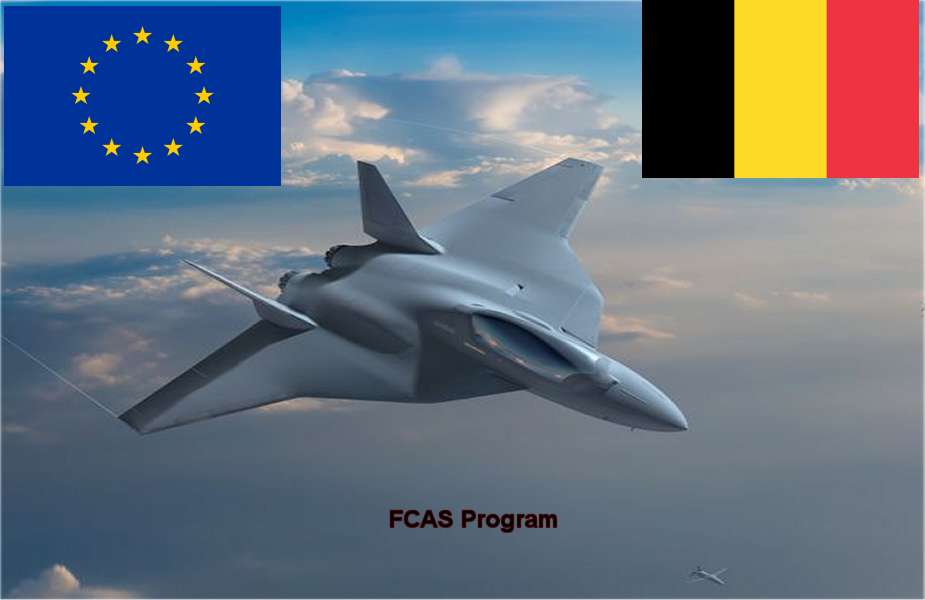Breaking news
Belgium officially becomes member of European FCAS - SCAF 6th Generation Fighter Program.
Belgium will officially become a member of the FCAS-SCAF military program (Future Air Combat System) in June 2025, according to a recent announcement by Defense Minister Ludivine Dedonder. This integration marks a significant turning point in European collaboration on advanced defense technologies.
Follow Air Recognition on Google News at this link
 Belgium will officially become a member of the FCAS-SCAF military program (Future Air Combat System) in June 2025. (Picture source: Airbus)
Belgium will officially become a member of the FCAS-SCAF military program (Future Air Combat System) in June 2025. (Picture source: Airbus)
Currently an observer member, Belgium is on the verge of becoming an active participant in the development of future combat aircraft, an ambitious initiative envisioning a 6th generation aircraft. This transition is planned for 2025, following a formal decision by the next Belgian federal government and the current program members: France, Germany, and Spain.
Minister Dedonder emphasized the importance of this integration for the Belgian defense industry, noting that it represents a unique opportunity to contribute to a new generation of air combat capabilities. She also mentioned that exploratory negotiations between Belgian companies and those from other member countries are underway to determine the added value that Belgium can offer.
Belgium commits to investing in the FCAS-SCAF program, with a budget already validated in the military programming law until 2029, capped at 360 million euros. This initiative is seen as a potential driver for job creation and technological advances in the Belgian aerospace and aeronautical industry, known for its competence and competitiveness. While specific details about the participation of Belgian companies have not yet been made public, it is plausible to consider examples of companies with the expertise to contribute to this program. For instance, Sabca, with its experience in aircraft component manufacturing, and Sonaca Group, specializing in aerostructures, could potentially be involved. Similarly, Techspace Aero (Safran Aero Boosters), known for aerospace propulsion systems, and Asco Industries, recognized for precision engineering, are other examples of companies that could lend their expertise. It's important to emphasize that these are merely examples based on the capabilities of these companies, and official information regarding their participation in the FCAS-SCAF program remains to be announced.
The FCAS-SCAF (Future Combat Air System) program, a European collaborative initiative in aerospace defense, is spearheaded by several leading companies. Dassault Aviation, based in France, plays a central role, bringing its renowned expertise in the design and manufacturing of combat aircraft. Airbus Defence and Space, active in Germany and Spain, also plays a significant part, particularly in the development of advanced technologies. The Spanish company Indra is involved in developing mission and combat systems, key components for the program's effectiveness. A Franco-German collaboration between Safran and MTU Aero Engines focuses on developing propulsion for the new combat aircraft. Finally, Thales, another French company, contributes its expertise in electronic and communication systems, crucial for ensuring the interconnectivity and interoperability of the various components of the FCAS-SCAF. Together, these companies strive to create an integrated and advanced air combat platform, suited to meet the challenges of security and defense in the 21st century.
The FCAS-SCAF program (Future Air Combat System), also known as FCAS-SCAF (Future Combat Air System), is a European cooperative initiative aimed at developing a revolutionary air combat system by 2040. This ambitious program plans to combine a sixth-generation combat aircraft, called the New Generation Fighter (NGF), with a range of interconnected and interoperable elements such as drones, making extensive use of artificial intelligence.
Designed to be more than just a combat aircraft, FCAS-SCAF presents itself as a networked combat system, integrating the capabilities of drones and other advanced technologies to create an air combat cloud. This approach aims to significantly increase the air superiority, flexibility, and firepower of the European armed forces while responding to future threats and adapting to technological developments.
The expansion of the FCAS-SCAF program to other countries, including Belgium, has recently raised concerns. Critical voices, like that of the CEO of Dassault, Mr. Trappier, highlighted the potential complications and impacts on France's role. Belgium's decision to acquire F-35 aircraft instead of initially participating in the Scaf program also fueled debates about the allocation of work to Belgian companies.
Despite these concerns, Belgium's integration into the FCAS-SCAF program represents an important step towards increased defense collaboration within the European Union. The FCAS-SCAF program, combining next-generation combat aircraft with drones and artificial intelligence, promises to transform the landscape of European air defense by 2040.
Belgium is thus preparing to play a key role in the future European defense, marking a turning point in its military and industrial commitments on the international stage.



















